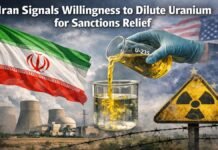
New Delhi: The United States and Iran are locked in a cycle of violence and threats after a series of drone attacks and airstrikes in West Asia, which have killed and injured dozens of American and Iranian-backed forces. The US has warned Iran and its proxies that it will not tolerate any further attacks on its troops and interests in the region, while Iran has accused the US of violating its sovereignty and endangering international security.
What triggered the conflict?
The latest escalation of tensions began on January 28, 2024, when an Iran-backed militia group called Kataib Hezbollah launched a drone attack on a US military base in Jordan, killing three US soldiers and wounding more than 40 others. The attack was one of the deadliest against US forces in the region since the 2019 killing of Iranian general Qassem Soleimani by a US drone strike in Iraq.
The US responded by launching airstrikes on 85 targets belonging to Kataib Hezbollah and the Iranian Revolutionary Guard Corps (IRGC) in Iraq and Syria on February 2, killing at least 15 fighters and destroying several weapons depots and command centers. The US said the airstrikes were defensive and proportional, and aimed at deterring future attacks by Iran and its proxies.
The next day, US and British forces carried out another round of airstrikes on Houthi rebels in Yemen, who are also backed by Iran and have been fighting a Saudi-led coalition since 2015. The US and Britain said the airstrikes were in support of the UN-led peace process and targeted Houthi missile and drone facilities that posed a threat to regional stability.
What is the reaction of Iran and its allies?
Iran and its allies have condemned the US airstrikes as illegal and aggressive and vowed to retaliate. Iran’s foreign ministry spokesman Saeed Khatibzadeh said the US was “playing with fire” and warned that Iran would not remain silent in the face of US “adventurism”. He also accused the US of supporting terrorism and violating the 2015 nuclear deal, which the US withdrew from in 2018 and has been trying to revive through indirect talks.
Iran’s supreme leader Ayatollah Ali Khamenei said the US was the “main enemy” of Iran and the region and called for the expulsion of US forces from West Asia. He also said Iran would continue to support the “resistance” movements in Iraq, Syria, Yemen and elsewhere, and urged them to unite against the US and Israel.
Iran also issued a warning to the US over the possibility of attacking two Iranian cargo ships, Behshad and Savij, which are sailing in the Red Sea and the Arabian Sea. Iran claimed the ships were carrying humanitarian aid and food, but the US suspected they were carrying weapons and intelligence equipment for the IRGC. Iran said any attack on the ships would be considered an act of terrorism and would have serious consequences for international security.
What is the stance of the US and its allies?
The US and its allies have defended their actions as necessary and justified and said they were ready to respond to any further provocations by Iran and its proxies. US President Joe Biden’s national security adviser Jake Sullivan said the US was not seeking a war with Iran, but would not hesitate to use force to protect its personnel and interests in the region. He also said the US was open to diplomacy and dialogue with Iran, but only if Iran complied with its nuclear obligations and stopped its destabilizing activities.

Sullivan said the US could not rule out the possibility of future attacks by Iran-backed militias or Houthi rebels in Iraq and Syria, and warned Iran to be prepared for a swift and strong response if it chose to respond directly to the US. He also said the US was working closely with its allies and partners, such as Israel, Saudi Arabia, the UAE, and Jordan, to coordinate their actions and share intelligence.
Sullivan said the US was still committed to the UN-led peace process in Yemen, and hoped to end the conflict and the humanitarian crisis there. He also said the US was supporting the efforts of the Iraqi and Syrian governments to restore their sovereignty and security, and to counter the threat of ISIS and other extremist groups.




















































